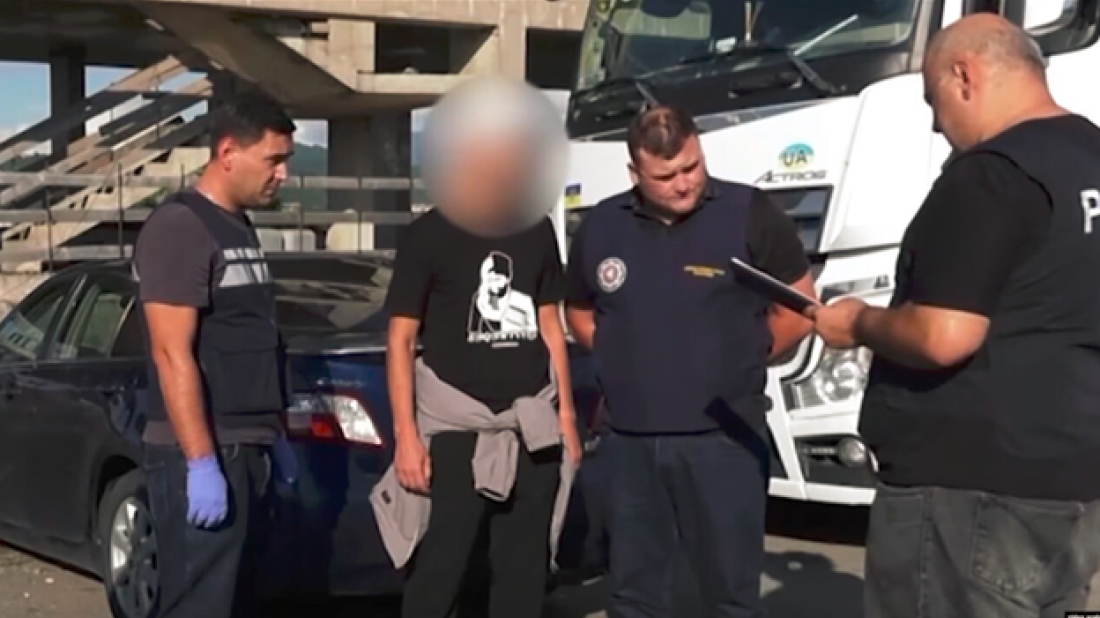Colombian plane crash with 15 onboard leaves no survivors
Colombian authorities on Wednesday located a missing plane carrying 15 people in the northeast of the country, with no survivors found, an Air Force s...

The State Security Service (SSS) of Georgia has confirmed the arrest of two Ukrainian nationals following the discovery of explosive substance inside a truck at the Sarpi customs checkpoint.
The Mercedes-Benz truck, carrying Ukrainian plates, entered Georgia on September 10 after passing through Romania, Bulgaria, and Turkey. Upon inspection, security officers uncovered 2.4 kilograms of hexogen—an explosive even more powerful than TNT—hidden in specially prepared compartments.
In addition to the explosives, law enforcement seized eight mobile phones, a laptop, electronic storage devices, multiple SIM cards from foreign operators, large sums of cash, and the narcotic substance cocaine.
The truck driver, identified as Ukrainian citizen M.S., and another Ukrainian national, D.Zh., who allegedly received the explosives on Georgian soil, are in custody. Both face charges under Article 236 (illegal purchase, storage, and transport of explosive substances) and Article 260 (possession of narcotic substances) of Georgia’s Criminal Code.
At a special briefing, the SSS revealed that the explosive was handed to the truck driver inside Ukraine by operatives of the Ukrainian special services, referred to as the “SBU.”
According to the testimony of one of the detainees, he was instructed to bring the substance into Georgia and deliver it to a designated contact. While he initially claimed the explosives were ultimately bound for Russia to be used in an operation codenamed “Pautina 2,” Georgian officials say their investigation instead points to a very different destination: a residential building in Tbilisi’s Avlabari district.
The SSS also confirmed that investigators are actively examining whether the case is connected to Georgia’s upcoming October 4 elections and to plans announced by radical groups.
“The State Security Service considers it important to share the part of the investigation that can be disclosed publicly, as it serves preventive purposes for the country’s security,” officials said at the briefing.
The revelations revive echoes of past allegations. On August 18, Russia’s Federal Security Service (FSB) claimed it had thwarted a Ukrainian attempt to target the Crimean Bridge, asserting that explosives for the operation were moved “through Georgia.”
Similar claims surfaced after the October 2022 bridge explosion, when Georgian nationals were implicated. At the time, Tbilisi urged caution, warning against drawing conclusions without evidence.
Now, with fresh arrests, a confirmed explosive cache, and possible ties to Georgia’s domestic politics, Moscow’s earlier accusations appear more difficult to dismiss outright.
The presence of hexogen—a substance notorious for its devastating power—has sharpened debate over Georgia’s security vulnerabilities with analysts highlighting three key scenarios:
A possible domestic terror plot, a transit route and potential election interference as the country heads to the polls on October 4.
Whichever version proves correct, the stakes are significant. Positioned at the crossroads of Europe, the Black Sea, and the South Caucasus, Georgia faces the dual risk of being a target and a pawn in larger geopolitical struggles.
For now, the investigation continues. But with powerful explosives seized, suspects in custody, and the specter of political disruption looming, Georgia finds itself once again in the crosscurrents of regional security tensions.
The S&P 500 edged to a record closing high on Tuesday, marking its fifth consecutive day of gains, as strong advances in technology stocks offset a sharp selloff in healthcare shares and a mixed batch of corporate earnings.
Sanctions are a long-used tool designed as an alternative to military force and with the objective of changing governments’ behaviour, but they also end up hurting civilian citizens.
High-level diplomatic consultations were held in Istanbul, Türkiye, on Monday as Ankara seeks to solidify the fragile progress of the Gaza ceasefire and accelerate the delivery of life-saving assistance to the strip.
Residents in Syria’s Kurdish-majority city of Qamishli have stepped up volunteer patrols amid growing pressure from the country’s Islamist-led government, expressing deep mistrust of Damascus despite a fragile U.S.-backed ceasefire.
Liverpool confirmed direct qualification to the UEFA Champions League round of 16 with a 6-0 win over Qarabağ at Anfield in their final league-phase match. Despite the setback, Qarabağ secured a play-off spot, with results elsewhere going in the Azerbaijani champions’ favour on the final matchday.
Iranian citizens and businesses are continuing to feel the impact of a nationwide internet shutdown imposed amid a sweeping crackdown on anti-government protests.
Palestine’s ambassador to the United Nations, Riyad Mansour, has said the permanence and success of the Gaza ceasefire depend on a full Israeli withdrawal from the territory and an end to efforts to dictate Gaza’s future.
“After all these demonstrations and internal challenges, Iran does not want to put itself in a position under threat from Mr. Trump or Israel,” political analyst Melih Demirtaş said, commenting on rising U.S.-Iran tensions in the region.
President Shavkat Mirziyoyev has announced wide-ranging reforms to policing and public safety in Tashkent, positioning the capital as a pilot city for a new, service-oriented law-enforcement model aimed at responding to modern security challenges and improving everyday safety for residents.
The Aerospace Committee of Kazakhstan’s Ministry of Digital Development, Innovation and Aerospace Industry has declared 2026 the Year of Visiting Baikonur, marking a strategic shift in how the famous cosmodrome is presented internationally.
You can download the AnewZ application from Play Store and the App Store.

What is your opinion on this topic?
Leave the first comment